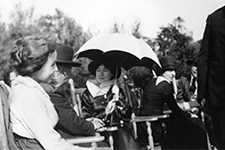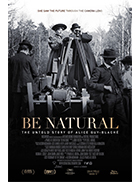Be Natural: The Untold Story of Alice Guy-Blaché
|  Don’t feel bad if you’ve never heard of Alice Guy-Blaché (1873–1968) or, if you have heard of her, don’t know much about her. Don’t feel bad even if you’re a film buff (which, if you’re watching this documentary, you probably are). Don’t feel bad because you’re not alone in your unfamiliarity and there are good reasons for it, which is part of the subject of Pamela B. Green’s fascinating new documentary Be Natural: The Untold Story of Alice Guy-Blaché. About eight minutes into the film Green includes a montage of interview moments in which she asks a wide range of industry figures—directors like Julie Taymor, Catherine Hardwicke, Peter Farrelly, Mark Romanek, and Patty Jenkins, executives like Howard Cohen (co-president of Roadside Attractions), stars like Julie Delpy, and even director/critic/historian Peter Bogdanovich—all of whom confess that they have no idea who she is. Green herself was in the dark until she saw a segment of a television show that mentioned Guy-Blaché among other prominent early women filmmakers and wondered why she had never heard of her. That was the seed from which Be Natural grew, and after watching it you will know who Alice Guy-Blaché was. You will know what she did. And, perhaps most importantly, you will understand why she has been unfairly neglected, marginalized, and, in some instances, outright erased from the official narrative of film history. Guy-Blaché’s almost forgotten status even among those of us who should know better is all the more shocking given the important role she played in the development of cinema. She was there at the very beginning of the medium; she was in the audience when the Lumière Brothers screened their films in the Grand Salon in Paris in December 1895, and her first film, The Cabbage Fairy (La fée aux choux, 1896), was one of the very first to tell a story, rather than just document everyday life. As a filmmaker, she constantly worked ahead of the curve, experimenting with close-ups, hand-color tinting, and even synchronized sound as early as 1905 (she worked with Gaumont’s Chronophone system, which involved actors lip-synching to pre-recorded songs). She was also thematically daring, making films that challenged social and gender norms, including the gender role-reversing comedy The Consequences of Feminism (Les résultats du féminisme, 1906), which the great Soviet director Sergei Eisenstein wrote about with great enthusiasm. The title of the film, Be Natural, comes from her primary direction to her actors, which was revolutionary at a time when film acting was overly melodramatic and calls into question the long-standing narrative that D.W. Griffith was the first real “actor’s director.” Guy-Blaché was involved at virtually every level of production for two decades, working as the writer/director of hundreds of films before becoming the production head of Gaumont and then founding her own company, Solax Studios, with production facilities and a stable of directors and actors. But, Be Natural is more than just the recounting of the life of a pioneering French female filmmaker; it is also a compelling look at how such a story gets told, which involved Green playing detective, chasing down leads, cold-calling people who may be or may know Alice Guy-Blaché’s descendants. We travel with her around the country and share in the exuberant joy of discovery, watching on recorded Skype videos as relatives dig out old letters and photographs and videotapes (one segment follows Green’s efforts to find a facility that can properly play and digitize an outdated videotape with an interview with Alice’s daughter, Simone, and another involves the discovery of a forgotten audiotaped interview with Alice herself). In other words, Be Natural is not just a biographical documentary, but a compelling drama about how history is written and how easily its major players can be erased when they don’t fit into the convenient, dominant narrative. Be Natural is Pamela Green’s feature debut, but it displays the confidence and panache of a veteran. Green has spent most of her career designing and creating title sequences and graphic motion sequences for dozens of major Hollywood productions. Her work in title design, motion graphics, and animation shows in Be Natural, which brings the past to life by transforming turn-of-the-20th-century maps, postcards, photographs, and hand-painted illustrations into dynamic, fluid, three-dimensional spaces through which we move in and out, sailing vertiginously across the Parisian skyline of the late 1890s or jotting across a United States map showing how far and wide Guy-Blaché’s history has been scattered. Names and dates and places fly fast and furiously—sometimes a bit too fast, making it difficult to keep up at times—creating a visual sense of historical depth and breadth. Green is an intrepid digger, an excavator who is determined to sort out the messy, incomplete history of a major international filmmaker as a means of both enriching the historical record and also emphasizing the difficulties faced by female filmmakers in the here and now. Interestingly, what Green reveals is that female writers, producers, and directors were not only not rare in the early days of film, but were quite common, and it wasn’t until the big banks and financial institutions took an interest in the industry in the 1920s that women were pushed to the margins. It is all the more unfortunate that Guy-Blaché’s accomplishments have since been downplayed, with many of her films being attributed to other (male) filmmakers, the studio she built being credited to her then husband, the Englishman Herbert Blaché, and the physical prints of her films being lost, discarded, or forgotten (at the time of her death in 1968, she was aware of the existence of about three copies of her hundreds of films). Thankfully, many of her films have since been dug out of archives, restored, and made available (six of them, in fact, are included in Flicker Alley’s excellent boxset Early Women Filmmakers: An International Anthology, which was released in 2017). Be Natural is thus also the story of how modern digital technology and an intrepid desire to unearth the past can come together to shed new light on a forgotten name and bring her pioneering work back into the public spotlight where it belongs. Copyright © 2019 James Kendrick Thoughts? E-mail James Kendrick All images copyright © Zeitgeist Films |
Overall Rating: 


 (3.5)
(3.5)


